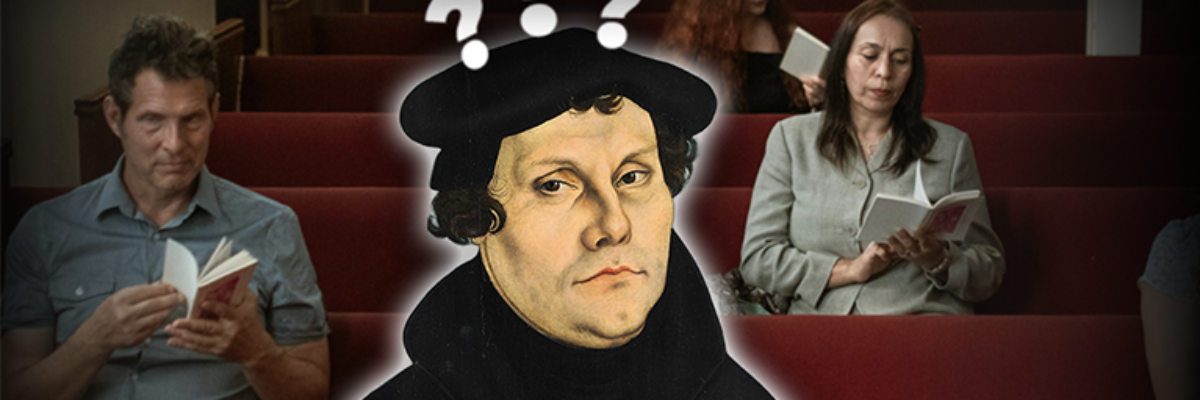
Karlo Broussard and host Cy Kellett receive a call asking how Protestants can Participate in the Catholic Mass.
Transcript:
Caller: A couple weeks ago, a coworker attended a Catholic wedding. And, you know, the following day at work, I guess she was told that probably best for her not to go receive the Eucharist. And she was not Catholic, not a priest, and so she was curious as to why this is.
Karlo: Yeah, all right. Well, one thought that initially comes to mind, Ron, is that this is consistent with early Christian practice. So, for example, in the middle of the second century A.D. 150, Justin Martyr writes in his work called his *First Apology*. Whenever he gets to the section on the Eucharist, he specifies two conditions that must be met in order for anyone to partake of the Eucharist that he describes in great detail as the body and blood of our Lord, and then describes the Mass itself and the proceedings of the Mass, which is strikingly similar to how we celebrate the Mass today.
Those two conditions, Ron, are number one, that they be baptized and number two, that they believe everything that we believe as Christians. So he specifies that that belief in everything the Christian people believe is a necessary condition for receiving the Eucharist. So that’s the first response. We do it simply because it’s consistent with early Christian practice. This is what we have done as Christians all along.
But of course, that just raises the question, well, what’s the rationale behind that? Well, here I think we can begin to make a few points. The act of Holy Communion, Ron, is an action that has wrapped up in it. It’s baked into the act itself. The speaking of a message, the proclamation of a message to all who are there, namely that I am in communion with the Catholic Church. You. Namely, that I believe everything that the Catholic Church teaches I should believe.
Getting back to Justin Martyr, it’s a visible action that has wrapped up within it that message. So insofar as I willingly approach the altar to receive Holy Communion, I am visibly proclaiming that message in the action itself to everybody there.
Now, Ron, I’m sure you can intuit where I’m going with this. If I engage in that action, which of itself is speaking to everybody there, that I am in communion in full with the Catholic Church, and I believe everything it teaches I should believe, but yet I don’t. Well, then what would that be? That would be a lie. That would be akin to Judas betraying our Lord with a sign of friendship, with an act of friendship, namely a kiss. He engages in an action that speaks friendship, but yet orders it against friendship. There’s a perversion of the act itself and thereby a lie.
Similarly, the principle applies here. If I engage in the action or the behavior of Holy Communion, which of itself speaks to everybody there, I believe everything the church tells me I should believe, but yet I don’t. Well then I’m acting against the behavior itself. I’m perverting the behavior. I’m undermining the behavior and I’m bearing false witness.
Caller: Picking up on what you said about the Eucharist. So I’m a recent relative. My wife and I are recently new Catholics, and sometimes we bring Protestant people from our former church to Mass. We were told that when they come up, they can go up to the altar rail and cross their arms and receive a blessing rather than the actual Eucharist.
Karlo: Yes.
Caller: Is, you know, what’s the source of that? Do you agree with that?
Karlo: All right, all right. So if I’m tracking you correctly here, Dwight, what you’re pointing out in your latter comments is that you’re inviting me in the previous call to offer him an alternative. Right. So. And I get that. I can see it 100%. That’s a great point, Dwight, and thank you for bringing that to our attention.
That is something I did fail to do because in the previous call I simply said why you cannot approach for Holy Communion, but I did not offer what a Protestant could do during Holy Communion. And so, which you’re. And so this is a great point and it’s excellent. What you’re offering is to invite the Protestant to possibly approach the priest with arms crossed for a blessing. What do I think of that? I think that’s a great thing to do.
What is sort of the source of that? I don’t know of any magisterial documentation that even specifies the permission of that. Whether that’s a directive of any sort, I do not know or if it’s just sort of a practice that has developed. But is it an okay practice, at least to my mind? Yeah. I don’t see anything wrong with it because all the priest is doing is offering a blessing which, if you unpack that, is just invoking a prayer for invoking God on behalf of the individual for a blessing that God would bless the individual.
And so that’s just intercessory prayer. That’s what the priest is doing. And insofar as he’s a priest, he’s able to bestow a special prayer upon the person that I as a layman would not be able to do. So intercessory prayer, nothing wrong with that.
So that’s one thing a Protestant could do. Now another thing to follow your advice here, Dwight, would be to also invite a Protestant to remain in their pew and just simply join us in prayer. And that’s if they’re not comfortable with going up to receive a blessing from the priest or the deacon, well, then they can remain in their pew and continue to pray and join us in that prayer.
So I agree 100% that I left off the other half of the equation and that we need to offer a positive answer as well as to what a Protestant may do and not just leave it with what he cannot do. So thank you for that, Dwight. That was excellent, man. Excellent advice.
Caller: That’s a fantastic answer. Really very encouraging. Thank you. Thank you.
Karlo: You’re welcome. You know what thought that comes to mind, Dwight, is you could always invite your Protestant friend. Hey, just stay in the pew and open up your Bible and just read John, chapter 6, verses 49 through 66.
Cy: But it gets an idea of what we’re doing here. Dwight, thank you very much. I gotta take the break. Right back with more Protestant challenges for Dr. Karlo Broussard on Catholic Answers Live.



